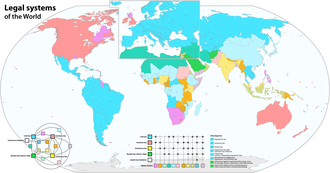Common law





Common law is a body of unwritten laws based on legal precedents established by the courts. It is a legal system that gives great precedential weight to common law, on the principle that it is unfair to treat similar facts differently on different occasions. The body of precedent is called "common law" and it binds future decisions. This principle is known as stare decisis.
History[edit]
Common law originated in England during the Middle Ages. It was developed by judges who applied their own sense of justice to the cases before them. Over time, these decisions were written down and became the basis for future judicial decisions. The common law system was later adopted by many countries that were once part of the British Empire, including the United States, Canada, Australia, and India.
Principles[edit]
The main principle of common law is that it is based on judicial decisions rather than statutes or written laws. Judges interpret and apply the law based on previous court decisions, which creates a consistent and predictable legal system. This is in contrast to civil law systems, which are based on comprehensive statutes and codes.
Common Law vs. Civil Law[edit]
Common law systems differ from civil law systems in several key ways:
- Sources of Law: Common law is based on judicial decisions, while civil law is based on written statutes and codes.
- Role of Judges: In common law systems, judges have a more active role in shaping the law through their decisions. In civil law systems, judges primarily apply the law as written.
- Precedent: Common law systems rely heavily on precedent, while civil law systems do not.
Common Law in Different Countries[edit]
- United States: The U.S. legal system is based on common law, with the Supreme Court being the highest authority.
- Canada: Canada follows a common law system, except for the province of Quebec, which follows a civil law system.
- Australia: Australia has a common law system, with the High Court of Australia being the highest court.
- India: India follows a common law system, influenced by its history as a British colony.
Modern Application[edit]
Today, common law continues to evolve as judges make new decisions based on changing social, economic, and technological conditions. It remains a fundamental part of the legal systems in many countries around the world.
See Also[edit]
References[edit]
<references group="" responsive="1"></references>
External Links[edit]
This article is a law-related stub. You can help WikiMD by expanding it!
Ad. Transform your life with W8MD's Budget GLP-1 injections from $49.99


W8MD offers a medical weight loss program to lose weight in Philadelphia. Our physician-supervised medical weight loss provides:
- Weight loss injections in NYC (generic and brand names):
- Zepbound / Mounjaro, Wegovy / Ozempic, Saxenda
- Most insurances accepted or discounted self-pay rates. We will obtain insurance prior authorizations if needed.
- Generic GLP1 weight loss injections from $49.99 for the starting dose of Semaglutide and $65.00 for Tirzepatide.
- Also offer prescription weight loss medications including Phentermine, Qsymia, Diethylpropion, Contrave etc.
NYC weight loss doctor appointmentsNYC weight loss doctor appointments
Start your NYC weight loss journey today at our NYC medical weight loss and Philadelphia medical weight loss clinics.
- Call 718-946-5500 to lose weight in NYC or for medical weight loss in Philadelphia 215-676-2334.
- Tags:NYC medical weight loss, Philadelphia lose weight Zepbound NYC, Budget GLP1 weight loss injections, Wegovy Philadelphia, Wegovy NYC, Philadelphia medical weight loss, Brookly weight loss and Wegovy NYC
|
WikiMD's Wellness Encyclopedia |
| Let Food Be Thy Medicine Medicine Thy Food - Hippocrates |
Medical Disclaimer: WikiMD is not a substitute for professional medical advice. The information on WikiMD is provided as an information resource only, may be incorrect, outdated or misleading, and is not to be used or relied on for any diagnostic or treatment purposes. Please consult your health care provider before making any healthcare decisions or for guidance about a specific medical condition. WikiMD expressly disclaims responsibility, and shall have no liability, for any damages, loss, injury, or liability whatsoever suffered as a result of your reliance on the information contained in this site. By visiting this site you agree to the foregoing terms and conditions, which may from time to time be changed or supplemented by WikiMD. If you do not agree to the foregoing terms and conditions, you should not enter or use this site. See full disclaimer.
Credits:Most images are courtesy of Wikimedia commons, and templates, categories Wikipedia, licensed under CC BY SA or similar.
Translate this page: - East Asian
中文,
日本,
한국어,
South Asian
हिन्दी,
தமிழ்,
తెలుగు,
Urdu,
ಕನ್ನಡ,
Southeast Asian
Indonesian,
Vietnamese,
Thai,
မြန်မာဘာသာ,
বাংলা
European
español,
Deutsch,
français,
Greek,
português do Brasil,
polski,
română,
русский,
Nederlands,
norsk,
svenska,
suomi,
Italian
Middle Eastern & African
عربى,
Turkish,
Persian,
Hebrew,
Afrikaans,
isiZulu,
Kiswahili,
Other
Bulgarian,
Hungarian,
Czech,
Swedish,
മലയാളം,
मराठी,
ਪੰਜਾਬੀ,
ગુજરાતી,
Portuguese,
Ukrainian